Never again
Topic: Social
 From HandWiki - Reading time: 12 min
From HandWiki - Reading time: 12 min
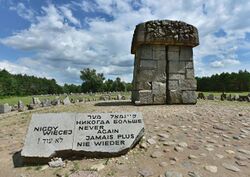
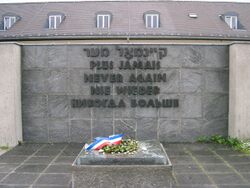
"Never again" is a phrase or slogan which is associated with the lessons of the Holocaust and other genocides. The slogan was used by liberated prisoners at Buchenwald concentration camp to denounce fascism. It was popularized by Jewish Defense League founder Meir Kahane in his 1971 book, Never Again! A Program for Survival.
The exact meaning of the phrase is debated, including whether it should be used as a particularistic command to avert a second Holocaust of Jews or whether it is a universalist injunction to prevent all forms of genocide.
The phrase is widely used by politicians and writers and it also appears on many Holocaust memorials. It has also been utilized as a political slogan for other causes, from commemoration of the 1976 Argentine coup, the promotion of gun control or abortion rights, and as an injunction to war on terror after the September 11 attacks.
Origins

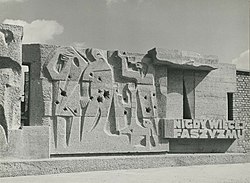
The slogan "Never again shall Masada fall!" is believed to be derived from a 1927 epic poem, Masada, by Yitzhak Lamdan.[2][3] The poem is about the siege of Masada, in which the Sicarii held out against Roman armies and, according to legend, committed mass suicide rather than be captured. In Zionism, an embellished version of the story of Masada became a national myth and was lauded as an example of Jewish heroism. Considered one of the most significant examples of early Yishuv literature, Masada achieved massive popularity among Zionists in the land of Israel and in the Jewish diaspora. The Masada myth became a part of the official Hebrew curriculum and the slogan became an unofficial national motto.[4] In postwar Israel, the behavior of Jews during the Holocaust was unfavorably contrasted with the behavior of the defenders of Masada:[2][3] the former were denigrated for having gone "like sheep to the slaughter" while the latter were praised for their heroic and resolute fight.[5]
Between 1941 and 1945, Nazi Germany and its allies murdered about six million Jews in a genocide, which has become known as the Holocaust.[6] The Nazi attempt to implement their final solution to the Jewish question took place during World War II in Europe. The first use of the phrase "never again" in the context of the Holocaust was in April 1945, when newly liberated survivors at Buchenwald concentration camp displayed it in various languages on handmade signs.[7][8] Cultural studies scholars Diana I. Popescu and Tanja Schult write that there was initially a distinction between political prisoners, who invoked "never again" as part of their fight against fascism, and Jewish survivors, whose imperative was to "never forget" their murdered relatives and destroyed communities. They write that the distinction has been blurred in the subsequent decades as the Holocaust was universalised.[8] According to the United Nations, the Universal Declaration of Human Rights was adopted in 1948 because "the international community vowed never again to allow" the atrocities of World War II, and the Genocide Convention was adopted the same year.[9][10] Eric Sundquist notes that "the founding of Israel was predicated on the injunction to remember a history of destruction—the destruction of two Temples, exile and pogroms, and the Holocaust—and to ensure that such events will never happen again".[2] The slogan "never again" was used on Israeli kibbutzim by the end of the 1940s, and was used in the Swedish documentary Mein Kampf in 1961.[11]
Definition


According to Hans Kellner, "Unpacking the semantic contents of 'Never Again' would be an enormous task. Suffice it to say that this phrase, despite its non-imperative form as a speech act, orders someone to resolve that something shall not happen for a second time. The someone, in the first instance, is a Jew; the something is usually called the Holocaust."[12] Kellner suggests that it is related to the "biblical imperative of memory" (zakhor), in Deuteronomy 5:15, "And remember that thou wast a servant in the land of Egypt, and that the Lord thy God brought thee out thence through a mighty hand and by a stretched out arm." (In the Bible, this refers to remembering and keeping Shabbat).[12] It is also closely related to the biblical command in Exodus 23:9: "You shall not oppress a stranger, for you know the feelings of the stranger, having yourselves been strangers in the land of Egypt."[13]
The initial meaning of the phrase, used by Abba Kovner and other Holocaust survivors, was particular to the Jewish community, but the phrase's meaning was later broadened to other genocides.[13] It is still a matter of debate whether "Never again" refers primarily to Jews ("Never again can we allow Jews to be victims of another Holocaust") or whether it has a universal meaning ("Never again shall the world allow genocide to take place anywhere against any group"). However, most politicians use it in the latter sense.[7] The phrase is used commonly in postwar German politics, but it has different meanings. According to one interpretation, because Nazism was a synthesis of preexisting aspects of German political thought and an extreme form of ethnic nationalism, all forms of German nationalism should be rejected. Other politicians argue that the Nazis "misused" appeals to patriotism and that a new German identity should be built.[14]
Writing about the phrase, Ellen Posman observed: "A past though often recent humiliation, and an emphasis on former victimhood, can lead to a communal desire for a show of strength that can easily turn violent."[15] Meir Kahane, a far-right rabbi, and his Jewish Defense League made use of the phrase. To Kahane and his followers, "Never again" referred specifically to the Jews and its imperative to fight antisemitism was a call to arms that justified terrorism against perceived enemies.[11][3][16] The Jewish Defense League song included the passage "To our slaughtered brethren and lonely widows: / Never again will our people's blood be shed by water, / Never again will such things be heard in Judea." After Kahane's death in 1990, Sholom Comay, president of the American Jewish Committee, said "Despite our considerable differences, Meir Kahane must always be remembered for the slogan 'Never Again,' which for so many became the battle cry of post-Holocaust Jewry."[11]
Contemporary usage
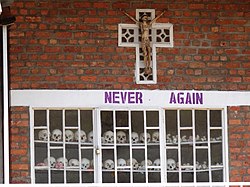
According to Aaron Dorfman, "Since the Holocaust, the Jewish community's attitude toward preventing genocide has been summed up in the moral philosophy of 'Never Again'",[13] meaning that the Jews would not allow themselves to be victimized.[17] The phrase has been used in many official commemorations and appears on many Holocaust memorials and museums,[8][2] including memorials at Treblinka extermination camp[2] and Dachau concentration camp,[18] as well as in commemoration of the Rwandan genocide.[19] It is widely used by Holocaust survivors, politicians, writers, and other commentators, who invoke it for a variety of purposes.[7][19]

For an increasing number of critics, the phrase has become empty and overused[8] as genocides continue to occur, and condemnation of genocide tends to only occur after it is already over.[7] Several commentators, including Adama Dieng, have noted that genocide has continued to occur, not never again but "time and again" or "again and again" after World War II.[9][20][21][19][7][17] Some have even termed the end of mass atrocity crimes an unrealistic goal given the limitations of the international order.[22] Multiple United States presidents, including Jimmy Carter in 1979, Ronald Reagan in 1984, George H. W. Bush in 1991, Bill Clinton in 1993, and Barack Obama in 2011, have promised that the Holocaust would not happen again, and that action would be forthcoming to stop genocide.[19][9][11] However, genocide occurred during their presidencies: Cambodia in Carter's case, Anfal genocide during Reagan's presidency, Bosnia for Bush and Clinton, Rwanda under Clinton, and Yazidi for Obama.[23][9] Elie Wiesel wrote that if "never again" were upheld "there would be no Cambodia, and no Rwanda and no Darfur and no Bosnia."[24] Totten argued that the phrase would only recover its gravitas if "no one but those who are truly serious about preventing another Holocaust" invoked it.[7]
In 2020, several critics of the Chinese government used the phrase to refer to the perceived lack of international reaction to the persecution of Uyghurs in China.[25][26][27][28] On 1 March 2022, after the Babi Yar Holocaust Memorial Center was hit by Russian missiles and shells during the battle of Kyiv, Ukraine's President Volodymyr Zelenskyy argued that "never again" means not being silent about Russia's aggression.[29]
The European Union was founded with the goal of anathemizing war on the European continent.[30] According to political scientists C. Nicolai L. Gellwitzki and Anne-Marie Houde, the European Union serves a role as a "sacred political myth" for Germany, upholding a "utopian vision of the possibility of atonement and redemption" and providing an identity unencumbered by the Nazi past.[31] The phrase "Never again," integral to Germany's post-Holocaust identity, sparked debate during the Gaza war. Intellectuals, including members of the Frankfurt School of neo-Marxist critical theory, disagreed over its scope. Some argued it should warn against potential genocides globally, including in Gaza. Conversely, Jürgen Habermas and co-authors emphasized its primary role in protecting Jewish life and Israel, deeming comparisons of Israel's actions to genocide as inappropriate.[32]
In 2025, A. Dirk Moses, Nils Gilman, and Zachariah Mampilly published an article arguing that "the imperative of 'never again' that lies at the center of global Holocaust memory culture has become a template for geopolitical entrepreneurs"—spearheaded by Israel and Rwanda—"to challenge the injunction against violent territorial expansion", which they undertook under the guise of preventing atrocities. They cite Russia's accusations of genocide against Ukraine cited to justify its 2022 invasion as an example of how this argument has spread internationally.[33] While according to Omer Bartov, Israelis afflicted with the "never again syndrome" see all threats and opposition as a sign of a second Holocaust which in turn justifies "again and again" oppression towards Palestinians.[34]
In September 2025, Holocaust Museum LA shared a post in its Instagram page saying "Never again can’t only mean never again for Jews". The Instagram message was initially praised online, with some interpreting it as an acknowledgement of Gaza genocide, but also faced intense criticism from pro-Israel activists. The post was later taken down and replaced by a statement that stated it had been misinterpreted. The museum quickly faced criticism online after journalist Ryan Grim reposted a screenshot of the message that had been deleted, writing: "Speechless. No words for this."[35]
Other uses
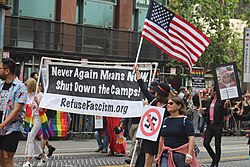

The rationale of "never again" also fueled the formation of truth commissions in Latin America in the aftermath of military coups, dictatorship, and political violence, in the intent that memory would prevent a reoccurrence. The Argentine truth commission and its 1984 report entitled Nunca más were a model for similar efforts elsewhere.[36] The slogan Nunca más is still used in annual commemorations of the 1976 Argentine coup.[37][38] In Brazil, "never again" has been used as a motif by groups that opposed the Brazilian military dictatorship since the 1980s, starting with the book Brazil: Never Again,[39] the human rights organisation Torture Never Again,[40] and the monument of the same name.[41]
In the Philippines, "never again" has been used as a rallying cry for the commemoration and remembrance of martial law under Ferdinand Marcos,[42][43] and is usually chanted alongside the phrase "never forget" on occasions such as the annual commemorations of the declaration of martial law on September 21,[44] and on the anniversary of the People Power Revolution on February 25,[45] which is a public holiday in the country.
"Never again" has also been used in commemoration of Japanese American internment and the Chinese Exclusion Act.[11]
After the September 11 attacks, President George W. Bush declared that terrorism would be allowed to triumph "never again". He referenced the phrase when defending the trial of non-citizens in military courts for terrorism-related offenses and mass surveillance policies adopted by his administration. Bush commented, "Foreign terrorists and agents must never again be allowed to use our freedoms against us." His words echoed a speech that his father had given after winning the Gulf War: "never again be held hostage to the darker side of human nature".[46]
The phrase has been used by political advocacy groups Never Again Action, which opposes immigration detention in the United States, and by Never Again MSD, a group that campaigns against gun violence in the wake of the Stoneman Douglas shooting.[11][47]
Never again is also used in climate activism to compare the inaction of governments to the rise of Nazism to their lack of action in reducing greenhouse gas emissions.[48]
See also
- Responsibility to protect
- The war to end war
- Never Forget (disambiguation)
- Lest we forget
References
- ↑ "A sign posted [probably in Buchenwald that says, "Form the Antinazifront! Remember the Millions of victims Murdered by the Nazis/ DEATH TO THE NAZI CRIMINALS." - Collections Search - United States Holocaust Memorial Museum"]. https://collections.ushmm.org/search/catalog/pa1165360.
- ↑ 2.0 2.1 2.2 2.3 2.4 Sundquist, Eric J. (2009) (in en). Strangers in the Land: Blacks, Jews, Post-Holocaust America. Harvard University Press. p. 601. ISBN 978-0-674-04414-2. https://books.google.com/books?id=9dI8cUKQplgC&q=Kahane+%22never+again%22. Retrieved 19 October 2020.
- ↑ 3.0 3.1 3.2 Philologos (6 May 2020). "What Is the Source of the Phrase "Never Again"?". Mosaic Magazine. https://mosaicmagazine.com/observation/history-ideas/2017/06/what-is-the-source-of-the-phrase-never-again/.
- ↑ Zerubavel, Yael (1995) (in en). Recovered Roots: Collective Memory and the Making of Israeli National Tradition. University of Chicago Press. pp. 69, 116, 258. ISBN 978-0-226-98157-4. https://books.google.com/books?id=kk6dB864zyYC&pg=PA116. Retrieved 10 May 2020.
- ↑ Feldman, Yael S. (2013). ""Not as Sheep Led to Slaughter"? On Trauma, Selective Memory, and the Making of Historical Consciousness". Jewish Social Studies 19 (3): 139–169. doi:10.2979/jewisocistud.19.3.139. ISSN 0021-6704.
- ↑ "Introduction to the Holocaust" (in en). Holocaust Encyclopedia. United States Holocaust Memorial Museum. 12 March 2018. https://encyclopedia.ushmm.org/content/en/article/introduction-to-the-holocaust. Retrieved 10 May 2020.
- ↑ 7.0 7.1 7.2 7.3 7.4 7.5 Totten, Samuel (2016). "What About "Other" Genocides? An Educator's Dilemma or an Educator's Opportunity?" (in en). Essentials of Holocaust Education: Fundamental Issues and Approaches. Routledge. p. 197. ISBN 978-1-317-64808-6. https://books.google.com/books?id=X6zDCwAAQBAJ&q=%22Never+again%22+phrase&pg=PA197. Retrieved 19 October 2020.
- ↑ 8.0 8.1 8.2 8.3 Popescu, Diana I.; Schult, Tanja (2019). "Performative Holocaust commemoration in the 21st century". Holocaust Studies 26 (2): 135–136. doi:10.1080/17504902.2019.1578452.
- ↑ 9.0 9.1 9.2 9.3 Power, Samantha (1998). "Never Again: The World's Most Unfullfilled Promise | The World's Most Wanted Man". Frontline (PBS). https://www.pbs.org/wgbh/pages/frontline/shows/karadzic/genocide/neveragain.html.
- ↑ "Universal Declaration" (in en). https://www.un.org/en/sections/universal-declaration/index.html.
- ↑ 11.0 11.1 11.2 11.3 11.4 11.5 "How the Holocaust motto Never Again became a rallying cry for gun control". Jewish Telegraphic Agency. 8 March 2018. https://www.jta.org/2018/03/08/united-states/never-evolved-holocaust-slogan-universal-call-fill-blank.
- ↑ 12.0 12.1 Kellner, Hans (1994). ""Never Again" is Now" (in en). History and Theory 33 (2): 127–128. doi:10.2307/2505381. ISSN 0018-2656.
- ↑ 13.0 13.1 13.2 Dorfman, Aaron. "Responding to Genocide". https://www.myjewishlearning.com/article/responding-to-genocide/.
- ↑ Art, David (2005) (in en). The Politics of the Nazi Past in Germany and Austria. Cambridge University Press. p. 20. ISBN 978-1-139-44883-3. https://books.google.com/books?id=q3oLu8I8hVMC&q=%22Nie+wieder%22+nazi&pg=PA20. Retrieved 19 October 2020.
- ↑ Posman, Ellen (2011). "Introduction: Never Again". in Murphy, Andrew R. (in en). The Blackwell Companion to Religion and Violence. John Wiley & Sons. ISBN 978-1-4443-9573-0. https://books.google.com/books?id=MF2Oxz3a0XwC&q=%22Never+again%22+phrase&pg=PT500. Retrieved 19 October 2020.
- ↑ School, Lee C. Bollinger Dean University of Michigan Law (1986) (in en). The Tolerant Society. Oxford University Press, USA. p. 274. ISBN 978-0-19-802104-9. https://books.google.com/books?id=IdWzbBghL7gC&q=never+again+slogan&pg=PA274. Retrieved 19 October 2020.
- ↑ 17.0 17.1 Gubkin, Liora (2007) (in en). You Shall Tell Your Children: Holocaust Memory in American Passover Ritual. Rutgers University Press. p. 117. ISBN 978-0-8135-4390-1. https://books.google.com/books?id=rwrfm8Gu_PAC&q=%22Never+again%22+phrase&pg=PA117. Retrieved 19 October 2020.
- ↑ Baer, Alejandro; Sznaider, Natan (2016) (in en). Memory and Forgetting in the Post-Holocaust Era: The Ethics of Never Again. Routledge. ISBN 978-1-317-03375-2. https://books.google.com/books?id=2s2VDQAAQBAJ&q=%22Never+again%22+phrase. Retrieved 7 May 2020.
- ↑ 19.0 19.1 19.2 19.3 Buettner, Angi (2016). "Never again: Rwanda, genocide, and the Holocaust" (in en). Holocaust Images and Picturing Catastrophe: The Cultural Politics of Seeing. Routledge. p. 85. ISBN 978-1-351-93052-9. https://books.google.com/books?id=6DmoDQAAQBAJ&q=never+again+slogan&pg=PT85. Retrieved 19 October 2020.
- ↑ "Genocide: "Never again" has become "time and again"". Office of the United Nations High Commissioner for Human Rights. 18 September 2018. https://www.ohchr.org/EN/NewsEvents/Pages/Genocide0918-7808.aspx.
- ↑ McCallum, Luke (6 April 2019). "Publications". https://genocidescholars.org/publications/. "The twentieth century has been called "The Age of Genocide." In the aftermath of the Holocaust, the slogan "never again" was coined; yet since 1945 we have seen the mass slaughter of Bengalis, Cambodians, Rwandans, Bosnians, Kosovars, and Darfuris, to name only a few."
- ↑ Gallagher, Adrian; Illingworth, Richard; Raffle, Euan; Willis, Ben (2025). "The permanency of mass atrocities: The fallacy of ‘never again’?". The British Journal of Politics and International Relations 27 (1): 310–330. doi:10.1177/13691481241241332.
- ↑ Fishel, Justin (17 March 2016). "ISIS Has Committed Genocide, Obama Administration Declares" (in en). ABC News. https://abcnews.go.com/US/secretary-state-john-kerry-declare-isis-committed-genocide/story?id=37713938.
- ↑ Rieff, David (February 1, 2011). "The Persistence of Genocide" (in en). Hoover Institution. https://www.hoover.org/research/persistence-genocide.
- ↑ Ibrahim, Azeem (3 December 2019). "China Must Answer for Cultural Genocide in Court" (in en). Foreign Policy. https://foreignpolicy.com/2019/12/03/uighurs-xinjiang-china-cultural-genocide-international-criminal-court/.
- ↑ Dolkun, Isa (14 September 2020). "Europe said 'never again.' Why is it silent on Uighur genocide?" (in en). Politico. https://www.politico.eu/article/uighur-genocide-china-why-is-europe-silent/.
- ↑ Sartor, Nina (3 December 2020). ""Never Again" all over again" (in en). The Silhouette. https://www.thesil.ca/never-again-all-over-again.
- ↑ Kaye, Jonah (23 August 2020). "Uyghur Camps And The Meaning Of 'Never Again'" (in en). The Detroit Jewish News. https://thejewishnews.com/2020/07/23/uyghur-camps-and-the-meaning-of-never-again/.
- ↑ Harkov, Lahav (2022-03-01). "Russia strikes Babyn Yar Holocaust memorial site in Ukraine" (in en-US). https://www.jpost.com/international/article-699034.
- ↑ Mocnik, Nena (2024-02-21). "Are there historical lessons across time and space? The ethics of 'never again' in European history teaching". Rethinking History (Informa UK Limited) 28: 154–180. doi:10.1080/13642529.2024.2313814. ISSN 1364-2529.
- ↑ Gellwitzki, C. Nicolai L.; Houde, Anne-Marie (2022-11-24). "Narratives, Ontological Security, and Unconscious Phantasy: Germany and the European Myth During the so-called Migration Crisis". Political Psychology (Wiley) 44 (2): 435–451. doi:10.1111/pops.12869. ISSN 0162-895X.
- ↑ "Israel-Hamas war opens up German debate over meaning of 'Never again'". The Guardian. 22 November 2023. https://www.theguardian.com/world/2023/nov/22/israel-hamas-war-opens-up-german-debate-over-meaning-of-never-again. Retrieved 5 December 2023.
- ↑ Gilman, Nils. "The New Politics of Territorial Expansion". https://www.noemamag.com/the-new-politics-of-territorial-expansion/.
- ↑ Weaponizing Language: Misuses of Holocaust Memory and the Never Again Syndrome Author(s): Omer Bartov Published by: Council for Global Cooperation Published On: 12 March 2024
- ↑ "US Holocaust museum removes anti-genocide post amid Gaza atrocities". https://www.aljazeera.com/news/2025/9/7/us-holocaust-museum-removes-anti-genocide-post-amid-gaza-atrocities.
- ↑ Silvana, Mandolessi (2023). "Latin America". The Routledge Handbook of Memory Activism. Routledge. p. 296. doi:10.4324/9781003127550-57. ISBN 978-0-367-65039-1. https://library.oapen.org/handle/20.500.12657/61166.
- ↑ Fernández Meijide, Graciela (24 March 2020). ""Nunca más", un compromiso vigente" (in es-ES). Infobae. https://www.infobae.com/opinion/2020/03/24/nunca-mas-un-compromiso-vigente/.
- ↑ "Día de la Memoria en Argentina: el necesario recuerdo de la dictadura". France 24. 24 March 2019. https://www.france24.com/es/20190324-memoria-argentina-necesario-recuerdo-dictadura.
- ↑ Schneider, Marcelo (24 July 2020). "35 years of "Brasil: Nunca Mais"". World Council of Churches. https://www.oikoumene.org/blog/35-years-of-brasil-nunca-mais.
- ↑ Charatan, Fred (20 March 1999). "Brazil challenges doctors accused of torture". The BMJ 318 (7186): 757. doi:10.1136/bmj.318.7186.757a. PMID 10082694.
- ↑ Mictlan, Monsieur (30 November 2021). "'Monument Tortura Nunca Mais' ('Torture Never Again')". https://www.atlasobscura.com/places/monument-tortura-nunca-mais.
- ↑ Diez-Bacalso, Mary Aileen (September 29, 2022). "Never again to martial law". Union of Catholic Asian News. https://www.ucanews.com/news/never-again-to-martial-law/98923.
- ↑ La Viña, Tony; de Belen, Bernardine (September 11, 2022). "Never again, never forget: The violent memory of Martial Law". https://www.rappler.com/voices/thought-leaders/opinion-never-again-never-forget-the-violent-memory-of-martial-law/.
- ↑ "Philippine Protesters Vow to 'Never Forget' Marcos Era Abuses". Voice of America. September 21, 2022. https://www.voanews.com/a/philippine-protesters-vow-to-never-forget-marcos-era-abuses/6756589.html.
- ↑ Burgonio, TJ (February 26, 2013). "Aquino to PH: Never again". Philippine Daily Inquirer. https://newsinfo.inquirer.net/364889/aquino-to-ph-never-again.
- ↑ Schneider, Rebecca (2006). "Never, Again". in Hamera, Judith A. (in en). The SAGE Handbook of Performance Studies. SAGE. p. 25. ISBN 978-0-7619-2931-4. https://books.google.com/books?id=mAL3rrhKW_IC&q=%22Never+again%22+W+Bush&pg=PA25. Retrieved 19 October 2020.
- ↑ "Jews Protesting Detention Centers: Inside Never Again Action". Jewish Journal. 17 July 2019. https://jewishjournal.com/commentary/analysis/301671/jews-protesting-detention-centers-inside-never-again-action/.
- ↑ Levene, Mark (2022). "The Holocaust Paradigm as Paradoxical Imperative in the Century of Anthropogenic Omnicide". Genocide Studies and Prevention 16 (1): 76–100. doi:10.5038/1911-9933.16.1.1886. ISSN 1911-0359. https://digitalcommons.usf.edu/gsp/vol16/iss1/8/.
Further reading
- Mocnik, Nena (2024). "Are there historical lessons across time and space? The ethics of 'never again' in European history teaching". Rethinking History 28 (1): 154–180. doi:10.1080/13642529.2024.2313814.
- Port, A.I. (2023). Never Again: Germans and Genocide after the Holocaust. Harvard University Press. ISBN 978-0-674-27522-5.
External links
 |
 KSF
KSF